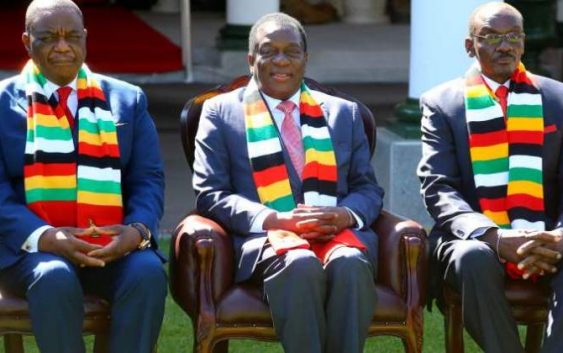- WICKNELL CHIVAYO left school at 15
- DISGRUNTLED Zimbabwe police stage uniform protest.
- MNANGAGWA wife Auxillia drops charges against nine women who boed her in Manicaland
- O.J. Simpson dies of cancer , aged 76.
- South Africa ANC is the cause of ZIMBABWE troubles claims Zimbabwe opposition politician Job Sikhala
‘ZIMBABWE is facing a terrible food crisis, ranked the fourth worst food insecure country in the world, due to corruption and mismanagement of its land resources’ according to the EU

‘ZIMBABWE is facing a terrible food crisis, ranked the fourth worst food insecure country in the world, due to corruption and mismanagement of its land resources’ according to the EU
The head of delegation of the European Union, which is helping to feed close to eight million food insecure Zimbabweans, Timo Olkkonen, told NewsDay last week that had it not been for corruption and mismanagement of its land resources, Zimbabwe would be exporting food into the region.
“That, indeed, if Zimbabwe had a thriving agricultural sector, then it would not be in the position of requiring food aid. I don’t think it’s acceptable that Zimbabwe was recently listed as the fourth most food insecure country in the world after countries such as Somalia, Yemen and DRC (the Democratic Republic of Congo). Zimbabwe should not be in the list with those countries that are in violent conflict,” he said.
Zimbabwe, which implemented a violent and chaotic land reform programme at the turn of the millennium, along with other southern African countries is battling effects of climate change, which has impacted on food security.
Olkkonen said Zimbabwe was the worst hit because of its failure to effectively invest in agriculture and increase productivity to the extent that while eight million people are in need of food aid in Zimbabwe, only two million need the same in Zambia, a country with similar weather patterns.
“Climate change, the drought and also to an extent the Cyclone Idai, of course, have a bearing and southern Africa as a whole, is experiencing the effects of climate change in a more severe way than many others parts of the world, so the drought is an issue,” he said.
“If Zimbabwe has an agricultural sector that is thriving, it could produce enough food covering its domestic needs and export. The average productivity of maize field is 0,9 tonnes per hectare in Zimbabwe. In Malawi or Zambia, it’s around 2,4-2,5. Clearly, Zimbabwe has the worst productivity in the cultivation of maize in Southern Africa,” he said.
EU is helping Zimbabwe develop its agricultural sector after investing nearly €100 million, according to Olkkonen, who said because of lack of tenure on the land, there is lack of investment in agriculture.
Zimbabwe has blamed EU and American sanctions for its economic problems.
But Olkkonen denied that the sanctions were hurting Zimbabwe, saying only reforms would get them to act.
“EU foreign policy is not decided by stadium events or the like. It’s decided on the basis of what is happening on the ground. So the decisions which are ultimately taken on the ground by our ministers are informed by the situation on the ground and how we see it and we have to be honest about it,” he said.
“(The year) 2019 was a very problematic year for Zimbabwe. So the amount of chicken which was eaten at the National Sports Stadium, I don’t know,” he said.
The opposition MDC has been accused for causing the EU and US to impose sanctions on Zimbabwe, but Olkkonen said even if the MDC was elected into government and continued with suppression of human rights, the sanctions would remain in place.
“It’s clear for us that we are impartial. We hear these allegations that the EU is favouring the MDC, that’s not true. Diplomats have to be impartial. There is a line that we draw that we don’t have to meddle in internal politics of other countries, but we do have an agenda on human rights, which Zimbabwe has also committed itself to,” he said.
“But in terms of party politics, we are impartial. That will depend completely on the situation on the ground — what’s the human rights situation on the ground how are the security forces acting vis a vis human rights, what democratic space is there? It’s not about the MDC being in government,” he said. – newsday
WELCOME EVERYONE: 298,841 MEMBERS, A Quarter of a million members, thank you for the fast growth, participation and continuous encouragement to others to join the group, and engage other progressive minded people in respectful and inclusive debate focused on information dissemination in issues that directly affect the ordinary person including human rights, good governance, accountability, transparency, housing, employment, development, girl child, equality, gender, peace, climate change, pollution, youth, freedom and more issues that directly affect the ordinary person. Information dissemination empowers the readers so that they are better placed to make well informed decisions and choices such as voting. Please feel free to add and encourage others to join.
INFORMATION IS POWER!-Thank you for the support. Please email all your articles, photos and breaking news, to newzimbabwe.vision@yahoo.com ,linkedin.com/in/sibusiso-ngwenya-563a572b ‘
Twitter-@sibungwen
or whatsapp to Mr Sibusiso Ngwenya 0044 79 3 9100534 for publication on the constantly growing online groups, currently standing as follows:
1) Zimbabwe Global News 298,841 Members
2) Newzimbabwevision.com website 24,836 likes
24,884 followers.
Manages Newzimbabwevision
Followed by 12,855
https://www.facebook.com/sibusiso.ngwenya.967/videos/10216973817674517/?t=4